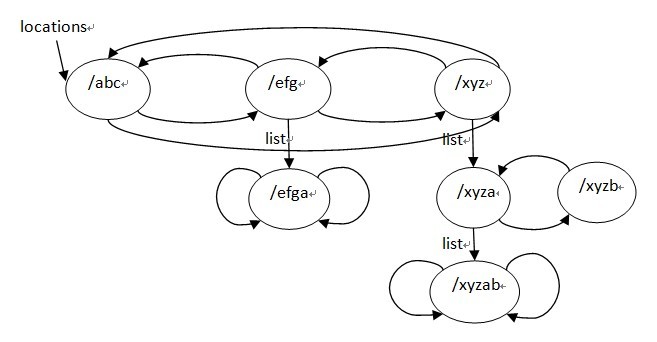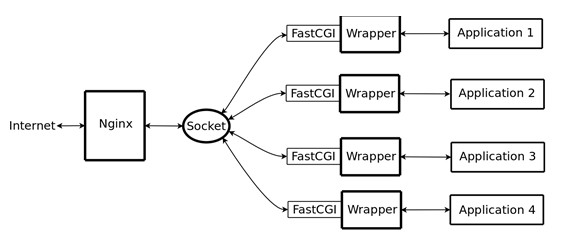#user nobody;
worker_processes 1;
#error_log logs/error.log;
#error_log logs/error.log notice;
#error_log logs/error.log info;
#error_log /usr/local/var/log/nginx/error.log warn;
#pid logs/nginx.pid;
#pid /usr/local/var/run/nginx.pid;
events {
worker_connections 256;
}
http {
include mime.types;
default_type application/octet-stream;
#kaiqi-default
#log_format main '$remote_addr - $remote_user [$time_local] "$request" '
# '$status $body_bytes_sent "$http_referer" '
# '"$http_user_agent" "$http_x_forwarded_for"';
#access_log logs/access.log main;
#access_log /usr/local/var/log/nginx/access.log main;
sendfile on;
#tcp_nopush on;
#keepalive_timeout 0;
keepalive_timeout 65;
#gzip on;
client_max_body_size 10m;
server {
listen 8080;
server_name localhost;
#charset koi8-r;
#access_log logs/host.access.log main;
location / {
root /usr/local/var/www;
index index.html index.htm;
}
#error_page 404 /404.html;
# redirect server error pages to the static page /50x.html
#
error_page 500 502 503 504 /50x.html;
location = /50x.html {
root html;
}
# proxy the PHP scripts to Apache listening on 127.0.0.1:80
#
#location ~ \.php$ {
# proxy_pass http://127.0.0.1;
#}
# pass the PHP scripts to FastCGI server listening on 127.0.0.1:9000
#
location ~ \.php$ {
root /usr/local/var/www;
fastcgi_pass 127.0.0.1:9000;
fastcgi_index index.php;
fastcgi_param SCRIPT_FILENAME $document_root$fastcgi_script_name;
include fastcgi_params;
}
# deny access to .htaccess files, if Apache's document root
# concurs with nginx's one
#
#location ~ /\.ht {
# deny all;
#}
}
# another virtual host using mix of IP-, name-, and port-based configuration
#
#server {
# listen 8000;
# listen somename:8080;
# server_name somename alias another.alias;
# location / {
# root html;
# index index.html index.htm;
# }
#}
# HTTPS server
#
#server {
# listen 443 ssl;
# server_name localhost;
# ssl_certificate cert.pem;
# ssl_certificate_key cert.key;
# ssl_session_cache shared:SSL:1m;
# ssl_session_timeout 5m;
# ssl_ciphers HIGH:!aNULL:!MD5;
# ssl_prefer_server_ciphers on;
# location / {
# root html;
# index index.html index.htm;
# }
#}
server {
listen 8081;
server_name develop.com;
#access_log logs/host.access.log main;
location / {
root /usr/local/var/www/develop;
index index.php index.html index.htm;
}
#error_page 404 /404.html;
# redirect server error pages to the static page /50x.html
#
#error_page 500 502 503 504 /50x.html;
#location = /50x.html {
# root html;
#}
# proxy the PHP scripts to Apache listening on 127.0.0.1:80
#
#location ~ \.php$ {
# proxy_pass http://127.0.0.1;
#}
# pass the PHP scripts to FastCGI server listening on 127.0.0.1:9000
#
location ~ \.php$ {
root /usr/local/var/www/develop;
fastcgi_pass 127.0.0.1:9000;
index index.php
fastcgi_index index.php;
fastcgi_param SCRIPT_FILENAME $document_root$fastcgi_script_name;
include fastcgi_params;
}
# deny access to .htaccess files, if Apache's document root
# concurs with nginx's one
#
#location ~ /\.ht {
# deny all;
#}
}
server {
listen 8082;
server_name phpmyadmin.com;
#access_log logs/host.access.log main;
location / {
root /usr/local/var/www/phpmyadmin;
index index.php index.html index.htm;
}
#error_page 404 /404.html;
# redirect server error pages to the static page /50x.html
#
#error_page 500 502 503 504 /50x.html;
#location = /50x.html {
# root html;
#}
# proxy the PHP scripts to Apache listening on 127.0.0.1:80
#
#location ~ \.php$ {
# proxy_pass http://127.0.0.1;
#}
# pass the PHP scripts to FastCGI server listening on 127.0.0.1:9000
#
location ~ \.php$ {
root /usr/local/var/www/phpmyadmin;
fastcgi_pass 127.0.0.1:9000;
index index.php
fastcgi_index index.php;
fastcgi_param SCRIPT_FILENAME $document_root$fastcgi_script_name;
include fastcgi_params;
}
# deny access to .htaccess files, if Apache's document root
# concurs with nginx's one
#
#location ~ /\.ht {
# deny all;
#}
}
include servers/*;
#include /usr/local/etc/nginx/conf.d/*.conf;
}
The above introduces the standard configuration of Nginxconf configuration file. , including relevant content, I hope it will be helpful to friends who are interested in PHP tutorials.
 index.html是什么文件?Feb 19, 2024 pm 01:36 PM
index.html是什么文件?Feb 19, 2024 pm 01:36 PMindex.html代表网页的首页文件,是网站的默认页面。当用户访问一个网站时,通常会首先加载index.html页面。HTML(HypertextMarkupLanguage)是一种用于创建网页的标记语言,index.html也是一种HTML文件。它包含网页的结构和内容,以及用于格式化和布局的标签和元素。下面是一个示例的index.html代码:<
 如何安装、卸载、重置Windows服务器备份Mar 06, 2024 am 10:37 AM
如何安装、卸载、重置Windows服务器备份Mar 06, 2024 am 10:37 AMWindowsServerBackup是WindowsServer操作系统自带的一个功能,旨在帮助用户保护重要数据和系统配置,并为中小型和企业级企业提供完整的备份和恢复解决方案。只有运行Server2022及更高版本的用户才能使用这一功能。在本文中,我们将介绍如何安装、卸载或重置WindowsServerBackup。如何重置Windows服务器备份如果您的服务器备份遇到问题,备份所需时间过长,或无法访问已存储的文件,那么您可以考虑重新设置WindowsServer备份设置。要重置Windows
 Nginx服务器中location配置实例分析May 24, 2023 pm 02:05 PM
Nginx服务器中location配置实例分析May 24, 2023 pm 02:05 PM首先我来大概的介绍一下location的种类和匹配规则,以nginxwiki的例子做说明:location=/{#matchesthequery/only.[configurationa]}location/{#matchesanyquery,sinceallqueriesbeginwith/,butregular#expressionsandanylongerconventionalblockswillbe#matchedfirst.[configurationb]}location^~/im
 web前端笔试题库之HTML篇Apr 21, 2022 am 11:56 AM
web前端笔试题库之HTML篇Apr 21, 2022 am 11:56 AM总结了一些web前端面试(笔试)题分享给大家,本篇文章就先给大家分享HTML部分的笔试题(附答案),大家可以自己做做,看看能答对几个!
 Windows Server 2025预览版迎来更新,微软改善Insiders测试体验Feb 19, 2024 pm 02:36 PM
Windows Server 2025预览版迎来更新,微软改善Insiders测试体验Feb 19, 2024 pm 02:36 PM在发布WindowsServer的build26040版本之际,微软公布了该产品的官方名称:WindowsServer2025。一同推出的,还有Windows11WindowsInsiderCanaryChannel版本的build26040。有些朋友可能还记得,多年前有人成功将WindowsNT从工作站模式转换为服务器模式,显示微软操作系统各版本之间的共性。尽管现在微软的服务器操作系统版本和Windows11之间有明显区别,但关注细节的人可能会好奇:为什么WindowsServer更新了品牌,
 nginx location中uri的截取如何实现May 18, 2023 pm 12:07 PM
nginx location中uri的截取如何实现May 18, 2023 pm 12:07 PM说明:location中的root和aliasroot指令只是将搜索的根设置为root设定的目录,即不会截断uri,而是使用原始uri跳转该目录下查找文件aias指令则会截断匹配的uri,然后使用alias设定的路径加上剩余的uri作为子路径进行查找location中的proxy_pass的uri如果proxy_pass的url不带uri如果尾部是"/",则会截断匹配的uri如果尾部不是"/",则不会截断匹配的uri如果proxy_pass的url带uri
 Nginx中的FastCGI怎么配置优化May 21, 2023 am 08:16 AM
Nginx中的FastCGI怎么配置优化May 21, 2023 am 08:16 AMfastcgi:fastcgi是从cgi发展改进而来的。传统cgi接口方式的主要缺点是性能很差,因为每次http服务器遇到动态程序时都需要重新启动脚本解析器来执行解析,然后结果被返回给http服务器。这在处理高并发访问时,几乎是不可用的。另外传统的cgi接口方式安全性也很差,现在已经很少被使用了。fastcgi接口方式采用c/s结构,可以将http服务器和脚本解析服务器分开,同时在脚本解析服务器上启动一个或者多个脚本解析守护进程。当http服务器每次遇到动态程序时,可以将其直接交付给fastcg
 怎么修改Nginx版本名称伪装任意web serverMay 14, 2023 pm 09:19 PM
怎么修改Nginx版本名称伪装任意web serverMay 14, 2023 pm 09:19 PM如何修改nginx默认的名称,可以稍微的伪装一下,也可以装x一般来说修改3个位置,一个是nginx.h、另一个是ngx_http_header_filter_module.c、还有一个ngx_http_special_response.c。提示:一般修改都是在nginx编译之前修改,修改完了之后需要重新编译代码如下:scr/core/nginx.conf#definenginx_version"1.4.7"#definenginx_ver"nginx/"n


Hot AI Tools

Undresser.AI Undress
AI-powered app for creating realistic nude photos

AI Clothes Remover
Online AI tool for removing clothes from photos.

Undress AI Tool
Undress images for free

Clothoff.io
AI clothes remover

AI Hentai Generator
Generate AI Hentai for free.

Hot Article

Hot Tools

Dreamweaver Mac version
Visual web development tools

MinGW - Minimalist GNU for Windows
This project is in the process of being migrated to osdn.net/projects/mingw, you can continue to follow us there. MinGW: A native Windows port of the GNU Compiler Collection (GCC), freely distributable import libraries and header files for building native Windows applications; includes extensions to the MSVC runtime to support C99 functionality. All MinGW software can run on 64-bit Windows platforms.

MantisBT
Mantis is an easy-to-deploy web-based defect tracking tool designed to aid in product defect tracking. It requires PHP, MySQL and a web server. Check out our demo and hosting services.

Atom editor mac version download
The most popular open source editor

Notepad++7.3.1
Easy-to-use and free code editor






